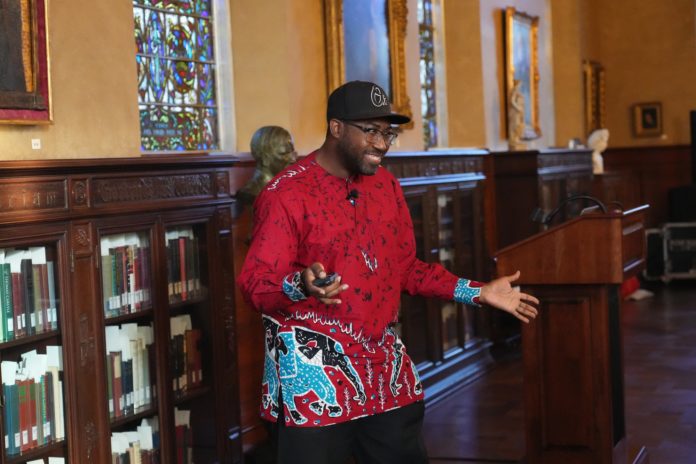
By Mykah Briscoe | Reporter
Reverend Dr. Heber Brown III gave a lecture at the Armstrong Browning Library Thursday afternoon about the work his program, the Black Church Food Security Network, is doing nationwide to empower Black churches through agriculture.
“We cultivate Black food ecosystems, anchored by Black churches, in partnership with Black farmers and accomplices,” Rev. Dr. Brown III said.
Rev. Dr. Brown III has worked as the pastor at Pleasant Hope Baptist Church in Baltimore, Maryland since 2008, according to his website.
“At 28 years old I got a real education about what it meant to be a Black Baptist preacher,” Brown said. “And a whole lot of it existed outside of Sunday morning.”
He said he learned many of the members of the congregation were being hospitalized “due to diet related issues.” Brown said he realized “that if food was part of the culprit that had them in the hospital,” then food was what needed to be dealt with to get them out.
After seeing the high prices at the market right across the intersection from his church, Rev. Dr. Brown III went back to his church and felt God calling him to look to his right where a 1500 square foot lot was, Brown said.
“On that day, with divine discontentment bubbling up inside me, God showed me a vision,” Brown said. This led Brown to start a garden and that 1500 square feet now produces 1200 pounds of produce.
In the wake of the 2015 Baltimore protests and the government’s response, Brown said they were forced “to walk forward in the vision” of spreading the program their church was doing with other churches and working together.
When kids weren’t able to eat due to the schools and transportation shutting down, they called the church, Brown said. Brown said he contacted farmers he knew, and the farmers drove the produce up and the church spread it out.
“I realized after about three weeks that that idea that was just in my head had now announced itself into the world,” Rev. Dr. Brown III said. “And the Black Church Food Security Network was born.”
However, his network does not stop there. They also have Operation Higher Ground where they “partner with congregations to establish or expand gardens or agricultural projects, such as rainwater collection or compost systems on church-owned land,” the Black Church Food Security Network said.
The network has other programs such as the Soil to Sanctuary Market, The A.R.C program and their newest program, the Black Farm Tour.
Rev. Dr. Brown III credits the history of Black farmers and churches beyond the trauma of slavery for inspiring how he does ministry, he said. “It gives me something to be nourished by and say maybe this nourishment can help engage issues around trauma because that trauma is real,” Brown said.
Rev. Dr Brown III also said that through working in the programs, it has influenced how he reads the Bible. “This book that comes from an agrarian society needs to be read in some kind of agrarian lens if you’re going to get what they’re trying to say,” Brown said.
One of Dr. Rev. Brown III’s main points is using what you have. “The idea that we have enough in our hands, if you’re Christian, if you’re not, like you have enough in your hands to do something with it,” Georgetown senior Lindsay Graf said. “I think that’s really amazing.”





